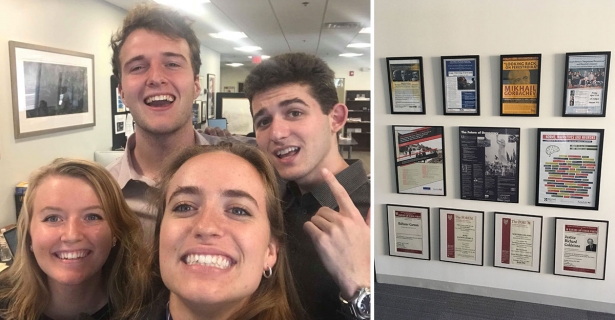Statistics on the Syrian Refugee Crisis are as massive as they are opaque: 6.6 million Syrians internally displaced, 2.98 million in hard-to-reach areas, 5.6 million registered refugees outside the country. These numbers mean something, but they don’t fully illustrate the breadth of the crisis and the tragedy these millions are facing. Mike Niconchuk, Tufts Class of 2011, spent four years in the Za’atri refugee camp in Jordan, and he has seen first-hand what this type of trauma can do to the brain and the body. This summer, I am working for Beyond Conflict’s Innovation Lab, where Mike is the Senior Researcher.
Formerly known as the Project on Justice in Times of Transition, Beyond Conflict is a Boston-based, non-governmental organization that has created powerful and innovative frameworks to open pathways for progress in peace talks, transitions to democracy, and national reconciliation in the aftermath of division and violence in over 75 countries. Founded in 1992, due in part to its founder’s attendance of the 1991 EPIIC symposium on “Confronting Political And Social Evil”, its “powerful methodology of shared experience is grounded in two core principles: that people can learn from each other and that people can change.” Renamed in 2010, Beyond Conflict began to explore the fields of brain and behavioral science in conjunction with its other work, which led to the Innovation Lab.
My work falls into three main categories: Countering Violent Extremism (CVE), Integration, and the Field Guide for Barefoot Psychologists.
When I first started, I had always thought of CVE as teams of special forces or CIA agents working at a high pace and with pressure to take out people strapped with suicide vests. That is not what I’m doing this summer. Beyond Conflict is seeking to understand the more psychological aspect of CVE: why people become violent extremists and what we can do to stop it.
On my first day, I received a stack of papers on the topic and dove right in. My favorite reading was “Two Sides of the Same Coin: An Examination of the Cognitive and Psychosocial Pathways Leading to Empowerment and Radicalization, and a Model for Reorienting Violent Radicalization” written by Mike Niconchuk and Kyle Dietrich F ‘08, which essentially discussed the similarities between the processes of radicalization and empowerment and the human needs for agency and belonging that they fulfill. A whole host of organizations are looking to collaborate on CVE as well, so I get to spend a lot of my time taking notes on video calls between Mike and these organizations and then filing these contacts into a trackable spreadsheet.
My long-term project involves working on a literature review of different measures of integration and how definitions of the term differ in the context of migrants or refugees and when discussing migrants or refugees who speak the same language as the host country. The hope for this project is that it results in a subjective integration index, to see how much migrants and refugees feel a part of their new host societies. A whole range of measures exist on integration, but so many of these measures are from the state perspective rather than the migrant perspective and are based on economic factors that often don’t account for nuance or detail. Tisch Library’s online “Jumbosearch” has been incredibly useful in gathering a whole range of research on this.
Primarily, my work centers around Beyond Conflict’s Field Guide for Barefoot Psychologists, a project that Mike is spearheading. The objective is to create a book and an app that provides accessible brain science and self-care exercises for refugees and migrants. These exercises can help them understand what impact displacement is having on their brains. The ultimate goal of these self-care exercises is to regain a sense of control.
Thus far, I’ve read the guide and created a short, one-page description of the project that can be given to potential donors. At the end of July, I will be going to New York with Mike to take notes at meetings and help produce videos for the app. The other day, I stumbled upon an article detailing the mental health crisis in Syria, and it reemphasized just how urgent this work is.
The work thus far has been fascinating. I find myself learning something new every day. I got to attend a conference on dehumanization and hear from a range of great minds. The three other interns who work at Beyond Conflict are great and the staff at the organization emanates passion and brilliance. Of course, it certainly gets overwhelming at times, and the problems of the world are immense and numerous. Yet, I am constantly reassured that with every war, every conflict, every refugee crisis, there will be legions of tireless people striving to do good because they know “it is better to light a candle than to curse the dark.”

